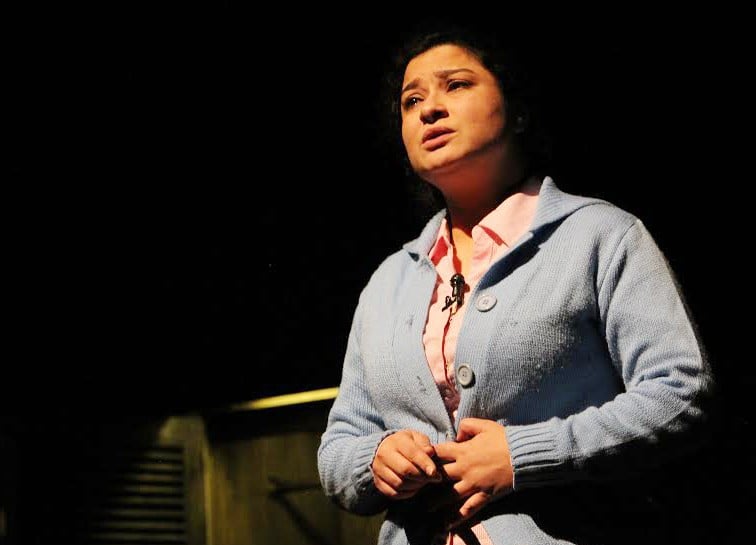
The story of Lorilei Guillory comes to life at the PNCA, Islamabad, featuring powerful monologues in English and Urdu by Nimra Bucha and Sania Saeed

In the last hundred years, so much art has come out of the artist’s taking an actively hostile stance towards the audience that one thinks we would all be inured to it by now. Yet it only takes an enterprise like Olomopolo Media, whose exceptional gifts include a truly exceptional violence of approach, to remind us sharply that the question modern art raises has never been fully answered, and the century will end as it began, with artistes and audience more unsure than ever about where they stand in relation to each other. Lorilei: A Meditation on Loss, penned by the American playwright Thomas Wright, is a piece of intense and revolting accomplishment and is executed with enormous skill.
This description isn’t meant to encourage or avert potential ticket-buyers, only to suggest possible larger justifications for a work that has, among its subsidiary intentions, the desire to arouse an almost continued flow of outrage. Whether Wright and Olomopolo Media along with the Justice Project Pakistan succeed at this latter task is a question raising a whole separate set of issues.
Lorilei -- a two-day double-bill staged at the PNCA, Islamabad -- featured monologues in English and Urdu by Nimra Bucha and Sania Saeed, respectively. The play narrated the true story of Lorilei Guillory -- a woman who set out to save the life of the paedophile Ricky Langley, the murderer of her six year-old son. Based on the actual transcriptions of the court case held in Louisiana, USA, in 1992, the play attempts to draw a line between ‘mercy’ and ‘forgiveness’.
The real questions are, does the work succeed in shaking our souls to the core, and, if so, is that in itself a good thing to do? I don’t pretend to know the answers, though my general suspicion is that stirring up the dirt in the id, and giving vivid articulation to the myths buried there, people might be shaken by the discovery of a lingering unconscious prejudice; others are only likely to have their bigotries reinforced, choosing the hate they prefer from the many samples on display.
Wright’s work, at its best, becomes didactic only by teaching an anti-knowledge, by disarming assumptions, dogmas, prejudices -- anything that makes us feel too safe and too confident. "Human wisdom is worth little or nothing," Socrates said at his trial in Athens, an assertion as unpalatable and subversive then as it is today. Wright, with wit and anger and compassion, persistently tore away the veneer with which society covers its ignorance and inadequacies. Lorelei understood that grappling with the conundrums of identity and death was not something to engage in as a means of learning answers or finding solutions, but rather as an end in itself, a never-ending, never-satisfying process that elevates humanity insofar as it confronts our fallen condition with honesty, vulnerability, and resolve.
As a reader, I perceive the distanced style of performance adopted by Nimra Bucha and the political commitment of the oeuvre as being in kinship with Brecht. One perhaps needed to see the show twice in order to begin to appreciate it, and both the performances illustrate well the way in which a critic can wrestle with the new and develop a deep appreciation for an innovative talent. One may begin to probe the television influences in Sania Saeed’s work -- an influence far from self-evident --and, perhaps most importantly, consider Saeed’s work in light of the theatrical ramifications of creating an avant-garde that is aware of and embraces its own traditions.
Saeed filled her performance with tension: tension born of moral and formal contradictions; tension born of tone oscillating wildly from frenzy to calm; tension born of the negotiation between poetic and profane, traditional and modern, normal and abnormal.
Nimra Bucha plays out the character’s paradox, of clinging tenaciously to values that she knows are rotting, by a kind of subversive mimesis -- on the vertiginous edge of stylisation -- in which her whole body becomes a two-dimensional image of codes on how to behave, move, interact through the fissures of which a range of conflicting yearnings and anxieties glimmer. Her hands move in what briefly resemble the sequences of mudras while she engages in the monologue; her speech is deliberate, sometimes detached as though being voiced by someone else, sometimes punctuated with unnerving pauses in which she seems to wait for her own echo, then capitulates into unexpected warmth; her presence is brooding yet alert; slight changes in her body turn tautness into aloof composure.
"It was not done consciously, but I think I carried the metaphor of the mask to its ultimate in this role, because of the type of social and emotional, static and fragmented hide and seek the character plays with herself," says Bucha after the performance.
The two most memorable sections of the performance come in Lorelei’s monologues that open and close the last section of the play: Mera naam Lorilei hai… Lorilei ka matlab jaantey hain aap? (My name is Lorilei… Do you what that means?)
The interjections provide stimulus for a long and powerful speech that laces wide-ranging images and narratives into a surprisingly unified whole. Somehow, Wright preserves all of the repugnant qualities while endowing Lorilei with a tragic solitude and an eternal sense of unfulfilled desires. Eruptions of fear at the thought of death, scattered throughout the script, reach their saturation point here. The result provokes a peculiar mixture of revulsion and sympathy.